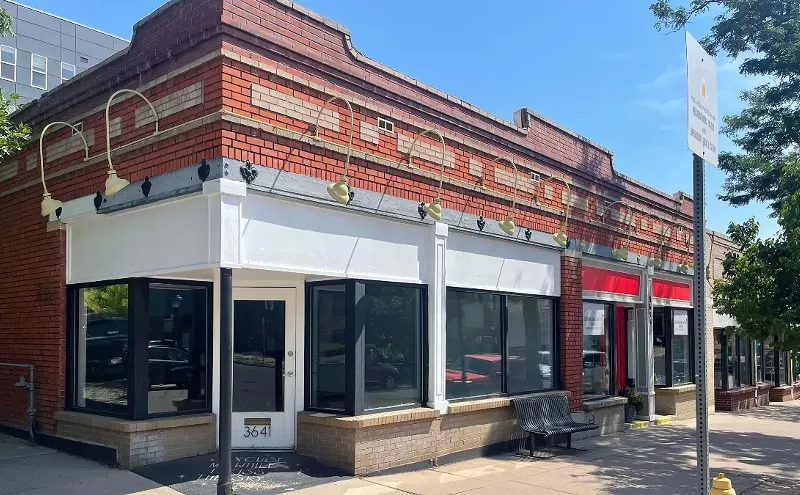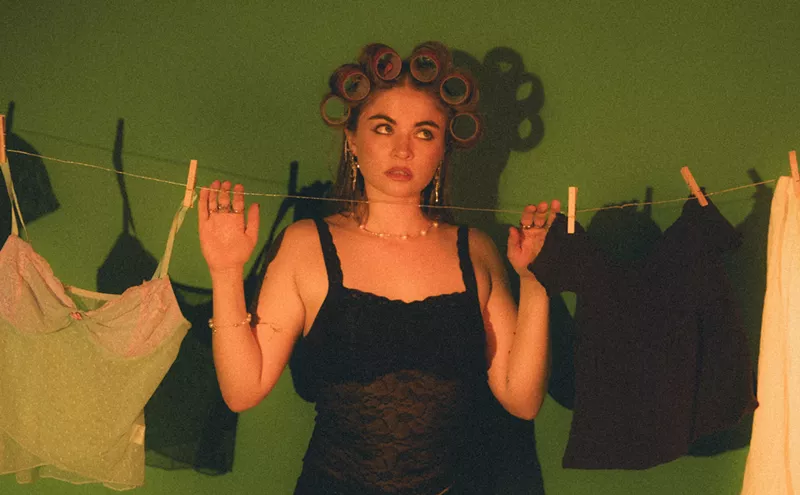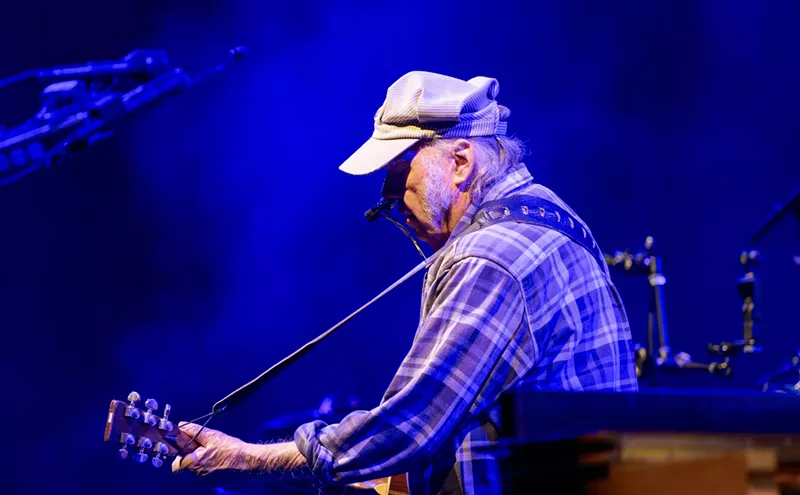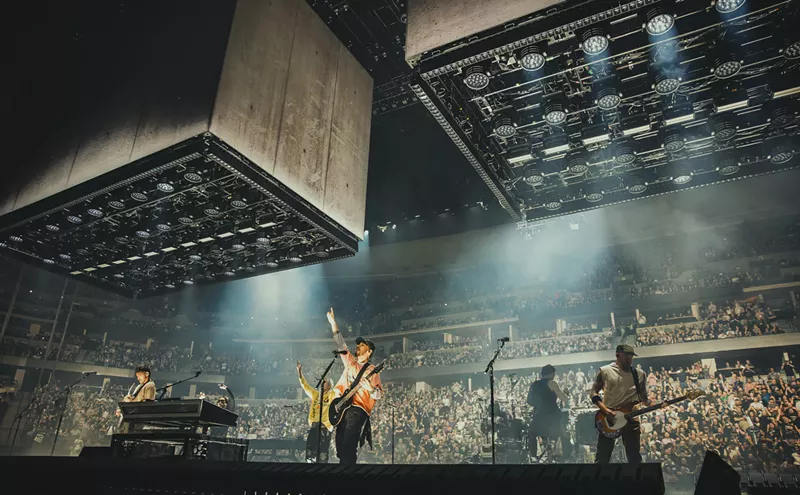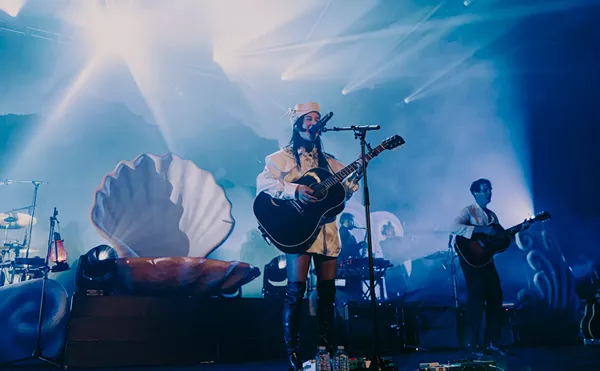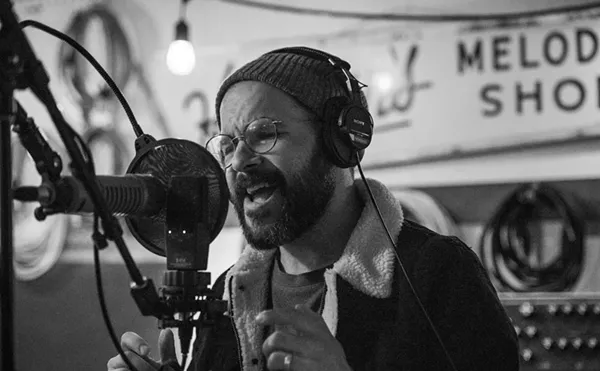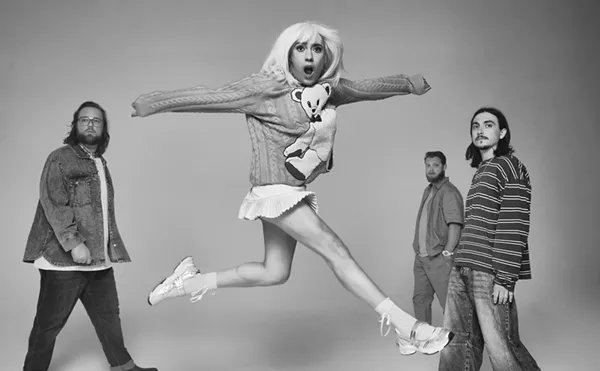DJ Quote is no stranger to controversy, having tangled with his fair share of detractors in the past. Actually, he's no stranger at all: To date, he's released more than 300 mixtapes, performed at parties at major sporting events across the country, and appeared on national television a handful of times. Last year, he branched out into video production with his Quote Media Films, and now he's using his profile and production capabilities to tackle a controversial subject.
Quote sees the Dispensary Music project he's working on with Iman S as a chance to capitalize on Colorado's medical marijuana phenomenon, a way to inform the public while at the same time creating exposure for the local hip-hop scene.
Although their version of Dispensary Music indeed has a mixtape component, it's only part of a more ambitious project that's taking a literal approach to embodying the title. Quote felt that incorporating a video aspect would give the project more heft, so in addition to Iman S -- a license holder himself -- penning rhymes about his smoking practices, he and Quote have filmed at rallies and conventions, and interviewed doctors in California, which legalized medical marijuana before Colorado did.
Locally, they've interviewed activists like Mile High NORML boardmember and Denver 420 Rally Director Miguel Lopez, as well as a host of pot practitioners, dispensary owners and legislators. When we spoke with Quote recently, he offered more insight into his project.
Westword (Dave Herrera): First of all, how long have you been working on this project?
DJ Quote: I'd probably say a little over a year. I can't put an exact date on it. A little over a year.
Ww: So you started last summer?
DJQ: Yeah, basically. Yeah.
Ww: And that's when you started filming? First of all, let's start at the very beginning: What was the idea for the whole thing? How did the idea come about?
DJQ: The idea was just to make the public more aware of what marijuana really does to people. Just trying to make people aware, whether they support it or don't support it. But then, when the big epidemic came to Colorado, I wanted to take advantage of it, because we're one of the states that was going along with it and trying to make it legal for everybody, so it doesn't leave out people like felons and other people who they disable and allow to get treatment for it because they felt like they broke a certain law.
Ww: So did you already have the concept in place before?
DJQ: I basically wanted to make it a concept, where I wanted it to be. I'm well known as a hip-hop DJ, but I wanted it to be a diverse project that was more like a documentary, but filled with music with the artist I'm working with, Iman S, at the time.
Ww: So the whole idea was kind of to make a documentary on the whole medical marijuana phenomenon?
DJQ: Yeah, from our eyes and what we consider Dispensary Music with the small research we have, because we couldn't captivate and get all the information that we needed. And that's why I traveled to places like L.A. and all these other places and did interviews and stuff.
Ww: What are the types of people you've interviewed for it?
DJQ: I'm trying to interview doctors who are doing research on it, the doctors who give you clearance for it. Doctors who can compare pain medicine to marijuana for people who are on Percocet and Vicodin, who hate drugs and alcohol, who have taken this as a choice, who have tried it and it works.
Ww: Did you know anybody firsthand who had a situation where they were on pain meds that inspired the project?
DJQ: The inspiration was to get the world to look at Colorado and a hip-hop epidemic and realize that we have people here with talent. And my choice of who I picked to put on it, or the main artist who I favor on it is my choice.
But my main thing was to open up a light so that people can see that there is hip-hop here in Colorado, and I was taking advantage of the epidemic with the marijuana by interviewing doctors and then making videos with people like Iman, who are rapping in his style of rapping but showing everything Colorado.
Ww: Right, but it's more an enlightening documentary kind of to shed light on the whole phenomenon of medical marijuana?
DJQ: Yes, but at the same time, hip-hop as equal. Because everybody's making documentaries, but nobody is a DJ like me that's going to support it and back it and put their neck out on the line and say that you support this and you're going to help [make people] aware and inform as many people as you are that it's not a bad drug or anything bad. And that's what I'm standing for with it.
Ww: So that is basically the whole scope of the project?
DJQ: Yes.
Ww: So how long is the documentary going to be?
DJQ: I'm thinking, because usually a DVD lasts about...I don't know -- I'm going to try and fill it up as much as I can, to be honest. The average thing is 120 minutes. I'm going to try to make it at least a hundred, like 105. I'm going to get as close as I can.
You've got to remember, it's not going to be just a documentary. Let me explain to you what I'm doing: I'm going to have interviews. I'm going to have live videos. I'm going to have footage of cannabis places in Colorado and out of Colorado -- you see what I'm saying?
Ww: Like actual growers or...?
DJQ: No, not actual growers. Like seen in the intro of the video that's causing people to throw up the white flag. Videos like that, that show I've already been doing research. You don't have to [show a] growing house to show that this is a good drug. We're doing more than just rapping in a room. We're actually spending money to invest to make ourselves look better, to show what Colorado is doing and what we're aware of.
So when you say filming actual growing houses -- no, we didn't. I went to one of the largest cannabis clusters in Colorado that people who say they want to talk about Dispensary Music didn't go to and know about. I went and filmed at 4:20, and of course, everybody was there smoking, but who was there filming and documenting and actually working? We were. That's my point.
Ww: Now, have you actually gone to dispensaries and filmed, as well, and kind of documented that process?
DJQ: Oh, yeah, that video was shot in a place here in Colorado, as well as the scene with the girl. That was filmed at a dispensary here, at a place called Natural Remedies.
Ww: So are those folks being interviewed as well?
DJQ: That's the perfect example: Not only in trade will I interview those people, it's going to be like commercials for them. They let me use their facilities for the video, and then I interview them and they do whatever they want to do and make a commercial that goes on there. They're supporting me, and I'm supporting them.
Ww: Now, are you also interviewing local doctors as well, who are issuing prescriptions for medical marijuana?
DJQ: That's what I'm looking for right now. I've had a few out-of-state doctors, but I haven't got to Denver doctors yet.
Ww: What have you learned from the out-of-state doctors?
DJQ: Really, they just make sure you are aware of what kind of drug you're signing up for and [make sure that this is] absolutely something that you want to try. They make it clear that it can work for you but [they also go over] all your other options before. How's it working for you - all that. They just make you consider things where you don't just try to make it a celebration thing.
Ww: So the guys that you've been talking to so far, have they offered any sort of enlightenment in terms of what marijuana is and what it does for folks, in terms of listing the benefits and that sort of thing?
DJQ: Oh, yeah. They give you a long list of stuff. Like when you get your registration and stuff, and you talk to a doctor and they give you your paperwork, they usually give you a pamphlet. I don't know the exact name of the pamphlet, but all that information is in there. It informs you about caregivers and all that good stuff, about who you need to go to, and what you can grow and what you can't grow, and all your laws and all your rights.
Ww: So the whole idea of you going out to L.A. to interview those doctors -- what was the thought behind interviewing those doctors, as opposed to interviewing doctors here who are actually prescribing the stuff?
DJQ: Just not be local, you know? Just how I do with my projects, not to just be local. Reach out to the other states that have and are agreeing with the same thing, that have it legal, that have dispensaries. That's why I went to the other states. If I just stayed in Colorado, it would be just like a Colorado rapper just doing Colorado features. I've always thought outside of the box.
Ww: So it was basically because it's already been legal in California, you went to see how it's being effected out there?
DJQ: Exactly.
Ww: Gotcha. So now you're going to talk to doctors locally and kind of compare notes?
DJQ: Yes, doctors and activists. Because it's not just going to be doctors. It's going to feature activists and people who support it. It's going to be people on there telling their stories, just like my friend who had the incident, with, you know, he tried painkillers and alcohol his whole life, and this works for him -- and he was totally against drugs.
So it's not going to just be certified doctors. It's going to be people who actually have their paperwork, who I'm going to allow to tell their stories on this DVD. So I'm going to have it be hip-hop -- and not just hip-hop, but rock and every kind of music. I'm trying to focus and have a lot of Colorado artists in it, and, yes, I'm going to favor my artist, but he won't be the only one on it.
Ww: So if you could sum up the whole mission of this project, how would you put it into words?
DJQ: I would say that me and Iman S are expressing our mentality and what we've learned and educated ourselves about the title, Dispensary Music, to be honest with you, our definition of Dispensary Music, in a media way.
Ww: Are there any plans to interview legislators or people who have helped pass these bills?
DJQ: Oh, yeah, that's all the people who I'm looking for, yes. Miguel Lopez, the guy I interviewed yesterday, that I filmed at a rally, he's the head of 420, so if that gives you the idea that I'm being serious about this, that it's not just a title.
Ww: So when are you looking to have this DVD finished?
DJQ: I'm looking at probably the first week of September because of all the interviews we have to do -- and that's complete, done, packaged up and everthing. And this is not going to be something that we're going to sell. We're going to give it away for free.
Ww: Where's it going to be available?
DJQ: I'm going to put it everywhere I can. I already have one sponsor that's going to press up 10,000 copies for me. So wherever I want to put those 10,000 -- if I could get in an airplane and drop them all over Colorado and not get a littering charge, I'll do it.
Ww: The obvious question: Are they going to be available at dispensaries?
DJQ: Yes. My goal -- and I mean this -- my goal is to try and interview and do something with as many dispensaries as I can that are willing to help me push this project.
Ww: Obviously, you're a proponent of the actual idea behind the medical marijuana legislation, the idea that it helps people who aren't able to be helped otherwise through pain medications. What are your thoughts on people who are abusing it, more or less, like using it to smoke recreationally?
DJQ: There's not enough proof for me to see it as abuse. I've never heard of a psychopath or a rapist or anybody with any kind of a serious crime that was at the time high. So that question...
Ww: Let me clarify what I'm talking about. There's been a rush of people getting medical marijuana licenses in Colorado, obviously, since they passed the law, and it's seems very unusual -- I would think -- for that many people to geniunely be suffering from pain.
DJQ: Here's my response to that: How come the crime rate hasn't gone up?
Ww: No, no, no. What I'm saying is, all the people who are getting licenses may not necessarily need --
DJQ: You think they're abusing it? And my answer to that is no, because it hasn't made the crime rate go up. Now, if we cleared meth and cocaine, then, yes, it would be a problem. But we cleared cigarettes. And, you know, that's a sensitive subject to me because I lost somebody to cancer in my family, so how dare somebody -- I'm not getting mad at you for questioning me with that question -- but cigarettes have killed more people than anything in the world. Why would you care about how many people sign up to give more tax money to the state, and it's helping people?
Ww: So you don't have a problem with the fact that maybe all the people who are signing up for it may not necessarily have a medical need for it but are using the medical ability --
DJQ: I do have a problem with that, because all of the people who are signing up that way are signing up falsely, and that's against the law.
Ww: Right. So you are against that?
DJQ: Yes, I am against that. Yes. But the reason I am against that is because I think it should just be legal for everybody. Like, I don't think you should be banned just because you're a felon. I think it should be available just like a cigarette, and that's what they're slowly doing.
Ww: Now, is that part of the overall mission of your project -- being a proponent of legalizing it altogether rather than just on a medical basis?
DJQ: Yes.
Ww: What are the biggest things that you've learned through all of your research and interviews? What are the insights you've gained from this whole process?
DJQ: Honestly, the biggest insight that I've learned is the only problem they're having with legalizing it is putting a tax on it. That's the biggest concern that I keep running into. As soon as the government can control it, it's going to be okay. It's just hard to control.
Once something's out of control, that's when you can say, "Oh, people are abusing it, because too many people are targeting it." But we can't target how many people are going to buy cigarettes, because you don't have to sign up for that. You don't have to go see a doctor. There's nobody on record with that. The only thing on record with cigarettes is death.
Ww: In terms of the medical benefits, what insights have you gained from this process?
DJQ: The response I keep getting from everybody is that it doesn't give any side effects. It doesn't make people vomit. There's not a high influx of people who are allergic to it, throwing up from it or having reactions to it. People just think all weed [is the same]. They don't know there's a difference between indica and sativa. One's an upper and one's a lower. A lot of people don't know that.
Everybody just thinks in the general public that getting high slows them down. That's not what weed does to people, if it's used right. I can't remember people's exact stories, because I have over thirty people videoed, thirty-one with the guy yesterday. It's just an alternative for people who can't deal with pain pills. It's an alternate solution for a good medication.
Ww: Do you feel ultimately it will be legalized at some point?
DJQ: I believe at some point, once it's controlled, yes, because why not legalize something that can't kill you?
Ww: In terms of the project you're working on right now, what is the impact that you hope it has?
DJQ: To show that there are hip-hop artists here from Colorado that are very talented, and that we have a scene here, and that they can rap well about it, as well as having high-quality HD videos without spending millions of dollars that high-end directors ask you to pay for. To show that we're moving with the times, basically.
Ww: That's the ultimate goal...?
DJQ: The ultimate goal is to prove and show people what your title means, instead of just recording it. I could've been in prison recording a rap CD and you wouldn't know, but if I showed you a DVD of me in the making, doing research, saying why I titled it that way, it will make more sense to you. It won't look just like rap, what I'm known for here.
Ww: So it's kind of a way to address an issue that you feel is important while at the same time bringing exposure to the hip-hop scene?
DJQ: Exactly, with artists here.



